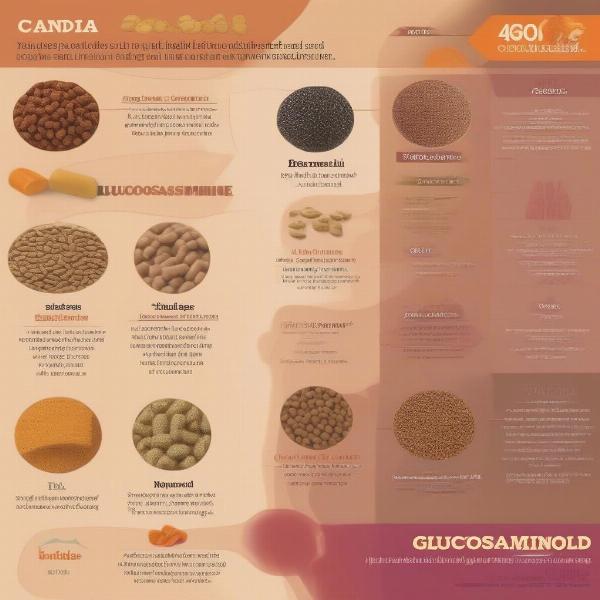Canidae large breed dog food is specifically formulated to meet the unique nutritional needs of larger dogs. This article will delve into the importance of choosing the right food for your large breed companion, covering everything from essential ingredients to potential health concerns. We’ll explore how the right diet can help prevent common issues like hip dysplasia and arthritis, ensuring your furry friend lives a long, healthy, and active life.
Understanding the Nutritional Needs of Large Breed Dogs
Large breed dogs, generally defined as those weighing over 50 pounds as adults, have different dietary requirements compared to their smaller counterparts. Their rapid growth during puppyhood and susceptibility to certain orthopedic issues necessitates a carefully balanced diet.  Canidae Large Breed Dog Food Ingredients This includes controlled levels of calcium and phosphorus to support proper bone development and prevent skeletal problems. Furthermore, optimal levels of protein and fat are crucial for maintaining muscle mass and providing sustained energy for their active lifestyles.
Canidae Large Breed Dog Food Ingredients This includes controlled levels of calcium and phosphorus to support proper bone development and prevent skeletal problems. Furthermore, optimal levels of protein and fat are crucial for maintaining muscle mass and providing sustained energy for their active lifestyles.
Proper nutrition is not just about quantity, it’s about quality. Choosing a high-quality canidae large breed dog food is an investment in your dog’s overall well-being.
Choosing the Right Canidae Large Breed Dog Food
With numerous options available, selecting the right canidae large breed dog food can be overwhelming. Look for formulas specifically designed for large breeds, often labeled as “large breed” or “giant breed.” These formulas typically contain controlled levels of calcium, phosphorus, and other essential nutrients to promote healthy growth and prevent joint problems.
What to Look For:
- Controlled Calcium and Phosphorus: Excessive calcium can lead to skeletal issues in large breed puppies.
- Glucosamine and Chondroitin: These supplements support joint health and can help prevent arthritis.
- High-Quality Protein Sources: Essential for building and maintaining muscle mass.
- Moderate Fat Content: Provides sustained energy and supports healthy skin and coat.
- Fiber: Aids in digestion and promotes regular bowel movements.
Avoid foods with fillers, artificial colors, flavors, and preservatives. Opt for whole grains, fruits, and vegetables, which offer added nutritional benefits.
Common Health Concerns in Large Breeds and the Role of Nutrition
Large breed dogs are prone to certain health conditions, such as hip and elbow dysplasia, bloat, and arthritis. A proper diet can play a crucial role in preventing or managing these issues. “Nutrition is the foundation of good health,” says Dr. Emily Carter, DVM, a veterinary nutritionist. “Feeding your large breed dog a balanced diet specifically formulated for their needs can significantly reduce their risk of developing these debilitating conditions.” For instance, controlled calcium intake during puppyhood can minimize the risk of hip dysplasia. Similarly, glucosamine and chondroitin supplements can help support joint health and alleviate the symptoms of arthritis.
Feeding Guidelines for Large Breed Dogs
Feeding guidelines vary depending on the specific canidae large breed dog food you choose, your dog’s age, activity level, and overall health. Always refer to the feeding instructions on the food packaging as a starting point. However, it’s important to monitor your dog’s weight and adjust the portion size accordingly to maintain a healthy body condition.
Tips for Feeding Large Breed Dogs:
- Divide their daily food allowance into two or three meals to prevent bloat.
- Avoid exercising immediately before or after meals.
- Ensure fresh water is always available.
- Consult your veterinarian if you have any concerns about your dog’s diet or weight.
Conclusion
Choosing the right canidae large breed dog food is a vital step in ensuring your furry friend’s long-term health and well-being. By understanding their unique nutritional needs and selecting a high-quality food, you can help prevent common health issues and provide them with the energy they need to thrive. Remember to consult with your veterinarian for personalized dietary recommendations based on your dog’s individual needs.
FAQ
- What is the best canidae large breed dog food for puppies? Consult your veterinarian for specific recommendations based on your puppy’s breed and individual needs. Generally, look for formulas with controlled calcium and phosphorus levels.
- How much should I feed my large breed dog? Follow the feeding guidelines on the food packaging and adjust according to your dog’s weight and activity level.
- Can I give my large breed dog human food? While some human foods are safe for dogs, it’s best to stick to a balanced dog food formulated for their specific needs.
- What are the signs of hip dysplasia in large breed dogs? Signs include lameness, difficulty getting up, and stiffness. Consult your veterinarian if you notice any of these symptoms.
- How often should I feed my large breed dog? Divide their daily food allowance into two or three meals to prevent bloat.
- What are some good sources of glucosamine and chondroitin for large breed dogs? These supplements are often included in large breed dog food formulas. You can also consult your veterinarian about adding supplements to your dog’s diet.
- How can I prevent bloat in my large breed dog? Feed smaller, more frequent meals, avoid exercising immediately before or after meals, and ensure fresh water is always available.
ILM Dog is your trusted source for all things canine. From breed selection to health and nutrition, we offer expert advice and guidance to help you navigate the joys and challenges of dog ownership. We specialize in providing practical, evidence-based information on dog care, covering everything from puppyhood to senior care. For personalized advice or to learn more, contact us at [email protected] or call +44 20-3965-8624. ILM Dog is here to support you and your furry companion on every step of your journey together.